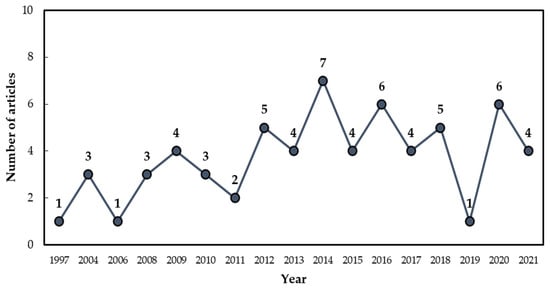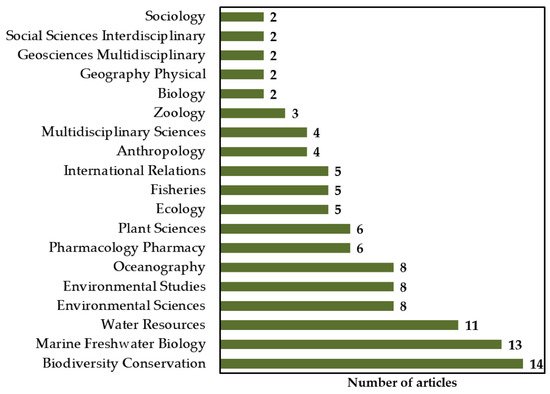Your browser does not fully support modern features. Please upgrade for a smoother experience.
Please note this is an old version of this entry, which may differ significantly from the current revision.
Traditional ecological knowledge (TEK) dominated by traditional populations, especially fishermen and women, has been the object of scientific research from different perspectives, disseminating information on fauna and flora in different environments [14]. Such interest refers to the importance that the set of information that these populations have on the dynamics of the local environment and the relationship with the environment in which they live. Generally, the transmission of this knowledge happens from generation to generation; however, it is still little valued by studies related to natural sciences. The study of this type of traditional ecological knowledge can support scientific studies and, therefore, help to fill the gaps in the understanding between the relationship between human activities and different ecosystems.
- traditional ecological knowledge
- environmental conservation
- local communities
- environment and society
- Community experiences
- social actors
1. Studies on TEK over Time
Studies on traditional ecological knowledge have been elements of research linked to ethnosciences in different perspectives. Initiatives in the scientific context emerged and became a form of interaction between the various forms of knowledge. An ethnoscience can be considered an alternative path to scientific rigor, without diminishing any of the methodologies produced by Western science, but using them as a tool for reinterpretations that allow a better understanding of the relationship between man and nature [38,39].
Fishermen and fisherwomen have traditional ecological knowledge that needs to be studied and systematized based on everyday practical actions, that is, revealing their direct relationship with the natural and cultural environment [15]. In the last two decades, many researchers have dedicated themselves to carrying out research showing how traditional ecological knowledge is linked to the community practices of traditional communities [14,40,41,42,43]. This scientific effort has contributed to the expansion of information about the fauna and flora, essential for the conservation of the ecosystem and endangered species, in addition to guaranteeing important data for scientific studies.
One of the first works on the relationship between man and the environment was published by Conklin [44], who recorded in detail the relationship of the Hanunóo people of the Philippines with plants and their cultivation, revealing that this people had a deep knowledge about the soil and plants. According to Souto [45], the scientific record carried out by Conklin demonstrated how the knowledge of traditional populations can contribute to classifying and recording information about local plants and animals. This scientific effort gave rise to a detailed theoretical foundation on the Hanunóo way of life and their relationship with the environment, especially with plants and soil, and demonstrated their diversity of knowledge and management of natural resources.
The publications on TEK found in the survey in the WoS database were registered from the year 1997, following a low number of publications for approximately 11 years. Only from 2008 onwards, scientific studies on traditional ecological knowledge seem to be highlighted in journals indexed in the Web of Science (Figure 1). After this period, it is expected that new paradigms about the man/environment relationship will emerge. From this evolution of the TEK systematization around the world, society can understand that man is an element of the environment and not the only one. The human being must leave behind the image of aggressor of the environment.

Figure 1. Number of articles published about the traditional ecological knowledge of fishermen around the world (n = 63). Source: Research data from Web of Science.
The oldest article found (1997) dealt with fishermen’s TEK on fish occurrence patterns at various spatio-temporal scales in the Fatala Estuary in Guinea, West Africa [46]. Among the results, they emphasized that the TEK investigation should be used as a preliminary analysis to help define sampling projects in tropical rivers and estuaries.
On the other hand, the most recent studies (2021) systematize TEK surveys of fishermen and women linked to the following themes: management of natural resources and control of pressure on the fish stock; knowledge of capture techniques and usefulness of the species, being transmitted vertically in the community; fish feeding; fisheries management, difference in fishing effort between fishermen and fisherwomen; link between traditional and scientific ecological knowledge; and paraphernalia [47,48,49,50]. A consensus of the authors concerns the record that TEK strategies adopted are essential to support scientific technical knowledge and future studies.
2. Studies on TEK across Countries
Research on the sharing of TEK and the perception of fishing dynamics among traditional fishermen living in two watersheds in Paraíba, Brazil, showed that each community has particularities and traditional knowledge about fishing dynamics [47]. It shows that the TEK is a source of information for the execution of water and fisheries resource management projects, resulting in significant advances in the quality of ecosystems and for the socio-economy of these communities.
In the Colombian Caribbean, in Uribia, the fishermen’s TEK on sea turtles helped researchers in fisheries and biodiversity management [48]. The study of fishermen’s knowledge is also necessary to understand and interpret the history of the way of life adopted by different fishing communities, countries, and continents, thus being an important element for scientific knowledge and for the construction of effective proposals for the maintenance of biodiversity in ecosystems and biomes. The scientific records of Nery et al. [47] and Vásquez-Carrillo and Peláez-Ossa [48] converge on the understanding that a qualified management of fisheries resources requires the appreciation of traditional knowledge, which is one of the fundamental elements for academic studies that discuss this topic linked to traditional communities. A deep understanding of past and current experiences of fishermen contributes to qualified interventions proposed by researchers together with fishermen. Although the TEK has great importance, there is still a devaluation in the process of elaborating local development programs and policies, which causes negative impacts on ecosystems and on the way of life of traditional communities [51].
3. Research Areas of the Studies on TEK
Many of the studies on traditional ecological knowledge are related to different areas within the academic environment, often interconnected. For understanding purposes, the more frequent Web of Science areas are showed in Figure 2. Biodiversity conservation was the one that most frequent, aiming to analyze temporal patterns, fish diet, reproductive cycle, fish spawning, biological and ecological characteristics, fish behavior, and the spatial and temporal variation of species.

Figure 2. Traditional ecological knowledge of fishermen and fisherwomen and themes involved by scientific research. Source: Research data from Web of Science.
The fishermen’s TEK also contributed information associated with the biology and ecology of sardines (Sardina pilchardus) in the North Atlantic [54]. The authors systematized the TEK of fishermen who live in the traditional communities of Peniche, in Portugal. Fishermen provided valuable information on taxonomy, habitat, behavior, migration, development, spawning season, and accumulation of fat in sardines; and this traditional knowledge had agreements with the scientific literature [54]. The authors also recorded the main dietary habits and beliefs of fishermen, knowledge that can help improve the management of fisheries resources, consequently in the conservation of sardines.
In the United Arab Emirates (UAE), fishermen’s TEK in relation to sawfish ecology is in particular linked to the status, uses, and cultural significance of the species for the community [55]. The data revealed that there is a great decline of the population of the sawfish, and that the waters of Abu Dhabi play an important role for the existence of the studied species. In addition, in this region, it is possible to carry out research and to monitor the species. In the end, the authors stated that in this place it is important to carry out actions for the conservation and recovery of the sawfish, as a strategy to avoid the total disappearance and recover the species. The association of scientific and traditional knowledge is evidenced in the European (Peniche, Portugal) and Asian (United Arab Emirates) continents, according to records published, respectively, by Braga et al. [54] and Jabado et al. [55]. The authors converge based on the results on the association of TEK and academic knowledge to support actions to mitigate environmental degradation and the elaboration of concrete proposals for the conservation of fish stocks, especially sardines and sawfish, respectively.
Studies with other species of aquatic fauna were also highlighted in research on TEK, such as manatees, turtles, dolphins, Cassis tuberosa, and otters. When analyzing manatee hunting techniques, researchers observed a food preference for 29 species of aquatic and semiaquatic plants, in addition to realizing that fishermen have mastery over the biology and behavior of this mammal in Amazonian waters [56]. Study of this scale and nature are essential to help in the elaboration of conservation plans for the species in the region, especially for this species that is fished in a predatory way.
This entry is adapted from the peer-reviewed paper 10.3390/su14094899
This entry is offline, you can click here to edit this entry!
